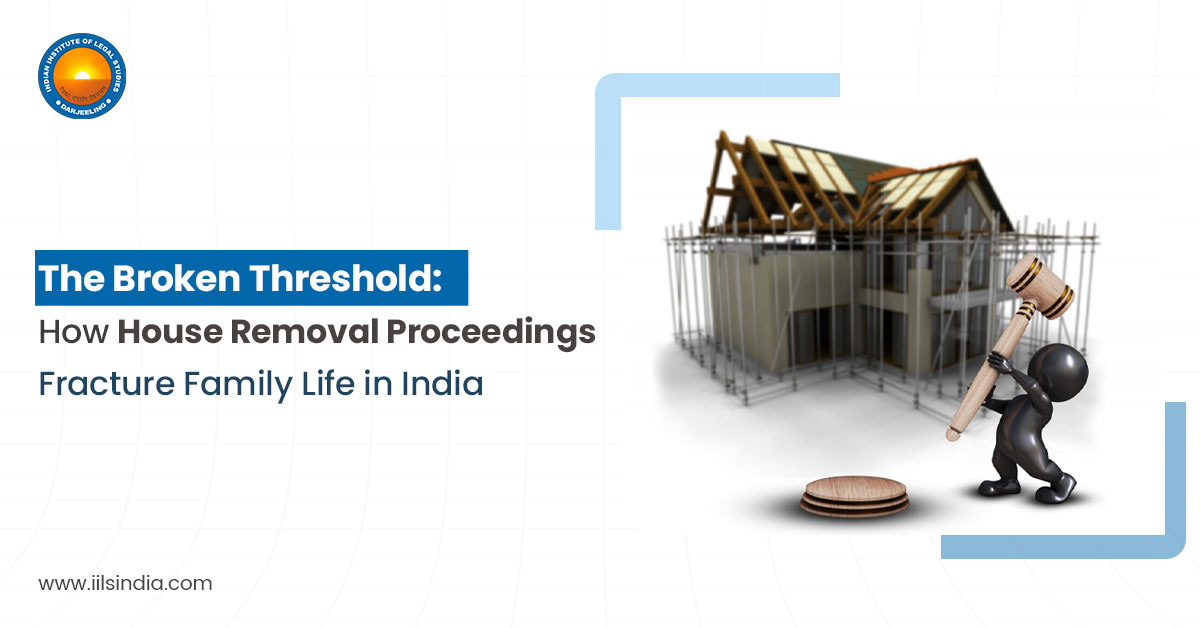Abstract: In India, where homes weave family stories, house removal proceedings act as brutal evictions, fracturing the very fabric of family life. This essay explores the human cost beyond legalities, highlighting the anxiety, financial strain, and social dislocation borne by displaced families, particularly children. It urges legal reforms, strong support networks, and a collective commitment to uphold the right to a haven, not a broken threshold.
For countless families in India, home is not merely bricks and mortar. It’s the echo of laughter, the aroma of familiar spices, the laughter lines etched by shared stories. But this haven can be abruptly shattered by the chilling knock of eviction, a harbinger of house removal proceedings. In India, where intricate family structures often form the bedrock of society, these legal processes as students are aware of owing to the law study in West Bengal, often shrouded in bureaucratic layers, have the brutal power to unravel the very fabric of family life.
The grounds for eviction, from rent arrears to property disputes, paint a varied picture. Yet, beneath the legal justifications lies a stark reality: the human cost of displacement. The specter of eviction casts a long shadow, infusing family dynamics with anxiety and uncertainty. Parents grapple with the burden of failing to provide a stable roof, their faces etched with guilt and despair. Children face the bewildering prospect of uprooting their lives, leaving behind familiar faces and childhood haunts. Studies in India have documented the stark emotional consequences of eviction on children, with cases of heightened anxiety, depression, and academic decline, underscoring the lasting scars it can leave on their development.
The financial strain adds another layer of hardship. Affordable alternative housing, particularly in urban centres like Mumbai or Delhi, can be a mirage. Families are often forced into cramped, substandard dwellings in marginalized neighbourhoods, jeopardizing their health and safety. This economic pressure amplifies existing tensions within families, leading to arguments, resentment, and even instances of domestic violence.
For many, navigating the legal labyrinth of eviction proceedings further exacerbates the ordeal. The complexities of the legal system, often opaque and inaccessible to the less educated or financially disadvantaged, leave families vulnerable to exploitation and unfair outcomes. This is where the role of legal aid and pro bono services becomes paramount, ensuring that access to justice is not tethered to socioeconomic realities.
However, amidst the bleak realities, flickers of hope exist. A growing awareness of the human cost of evictions has led to initiatives aimed at mitigating its impact. Community support networks, legal aid clinics, and NGOs are playing a crucial role in providing assistance and advocating for families at risk. Additionally, the judiciary has shown a growing sensitivity towards the emotional and social consequences of eviction proceedings, advocating for due process and prioritizing the family’s best interests.
To truly uphold the right to housing, a multi-pronged approach is essential. Legal reforms that prioritize family well-being and provide safeguards against arbitrary evictions are crucial. Strengthening social safety nets and promoting affordable housing initiatives can lessen the economic burden of displacement. Community outreach programs can provide valuable support systems for families grappling with the emotional trauma of eviction.
Ultimately, the fight against the disruptive impact of house removal proceedings on family life is a collective responsibility. Through legal awareness and law study in West Bengal, social support, and a commitment to upholding human rights, we can strive to ensure that for families across India, home remains a sanctuary, not a battleground. This is where the true fight for justice lies, not in sterile courtrooms, but in weaving a safety net of empathy and support around families facing the threat of eviction.

